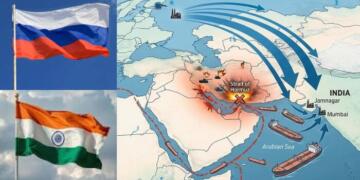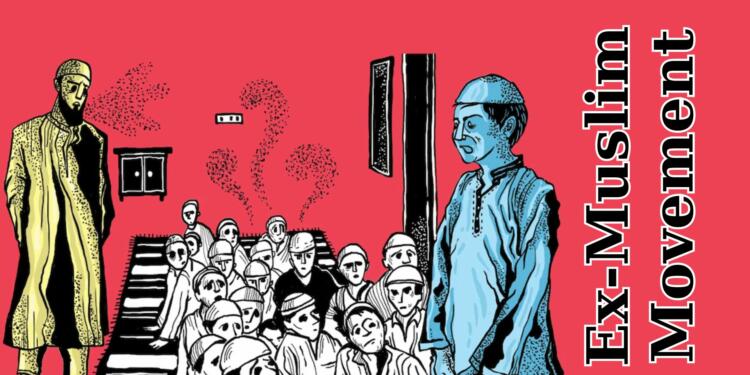The Ex-Muslim movement, a global phenomenon gaining traction, represents a growing wave of dissent within Islam. Understanding its origins and current spread is paramount to grasping its significance in contemporary religious discourse. As individuals leave Islam, often facing social ostracism and legal repercussions, the movement sheds light on complex intersections of faith, identity, and freedom. Amidst debates on religious autonomy and cultural pluralism, the Ex-Muslim movement challenges societal norms and underscores the evolving nature of religious identity. Its exploration offers invaluable insights into the dynamics of belief and dissent in today’s diverse and interconnected world.
Origins of the Ex-Muslim Movement
The Ex-Muslim movement, a significant phenomenon in contemporary religious discourse, traces its origins to the Western world. Emerging from the intersection of digital connectivity, intellectual dissent, and personal liberation, it represents a departure from traditional religious identity to the assertion of individual autonomy and freedom of belief.
Emergence in the Western World
The seeds of the Ex-Muslim movement were sown in the Western world, where freedom of expression and access to information enabled individuals to critically examine their religious beliefs. It gained traction, particularly in societies with significant Muslim populations, where individuals faced social and cultural pressures to adhere to Islam.
Pioneering Figures and Their Influence
Influential figures such as Ali Sina and Maryam Namazie played pivotal roles in shaping the narrative of the Ex-Muslim movement.
Ali Sina, an Iranian-Canadian blogger, founded online platforms that provided a space for Ex-Muslims to share their stories and engage in critical discourse about Islam.
Maryam Namazie, an Iranian-born writer and rights campaigner, became a prominent voice for Ex-Muslims, advocating for their rights and challenging the stigma surrounding apostasy.
Evolution from Traditional Atheism to Ex-Muslim Identity
Initially, many individuals who left Islam identified simply as atheists or agnostics, seeking to distance themselves from organized religion altogether. However, as the movement gained momentum, there was a shift towards recognizing and affirming the specific identity of Ex-Muslims. This evolution reflected a deeper engagement with the cultural, social, and political dimensions of leaving Islam, acknowledging the unique challenges and experiences faced by those who were raised within the faith.
Growth and Spread Worldwide
The growth and spread of the Ex-Muslim movement worldwide have been significantly influenced by the advent of the internet and social media, which have provided platforms for individuals to connect, share experiences, and organize collectively. This digital landscape has facilitated the emergence of a global network of Ex-Muslims, transcending geographical boundaries and enabling solidarity across diverse cultural contexts.
The internet and social media platforms have democratized access to information, allowing individuals to explore alternative perspectives and engage in discussions about religion and belief systems. Ex-Muslims have utilized blogs, forums, YouTube channels, and social media profiles to share their personal narratives, critique Islamic teachings, and connect with others who have undergone similar experiences. These digital spaces have provided a sense of community and support for Ex-Muslims, particularly those living in societies where openly renouncing Islam can carry severe social and legal consequences.
Case Studies from Different Regions
India
The Ex-Muslim movement has gained traction in India, with individuals using online platforms to challenge religious orthodoxy and advocate for freedom of conscience. Influential figures such as Sahil and Zafar Heretic have amassed large followings on social media, sparking conversations about apostasy and religious freedom.
Pakistan
Despite facing stringent blasphemy laws and societal stigma, Pakistani Ex-Muslims like Harris Sultan and Ghalib Kamal have bravely spoken out against religious dogma and extremism. Many have sought refuge abroad due to threats to their safety.
Iran
In the face of repressive state control and theocratic rule, Iranian Ex-Muslims have turned to online activism to voice dissent and promote secularism. Figures like Maryam Namazie have been instrumental in raising awareness about the plight of apostates in Iran and advocating for their rights.
Western Countries
Ex-Muslim communities in Western countries have flourished online, providing spaces for individuals to explore their identities, share resources, and build solidarity. Organizations like Ex-Muslims of North America (EXMNA) offer support and advocacy for those leaving Islam in Western contexts.
Challenges Faced by Ex-Muslims in Conservative Societies
In conservative societies, Ex-Muslims often face severe social ostracism, familial rejection, and even threats to their safety. Blasphemy laws and apostasy penalties in countries like Pakistan, Saudi Arabia, and Iran pose significant risks to those who openly renounce Islam. The stigma surrounding apostasy can lead to isolation and discrimination, making it difficult for Ex-Muslims to openly express their beliefs or seek support.
Factors Contributing to the Movement’s Expansion
The expansion of the Ex-Muslim movement has been driven by a combination of factors that have facilitated greater awareness, critical inquiry, and social mobilization among individuals who choose to leave Islam. These factors include
Access to Information through Digital Platforms
The proliferation of digital platforms such as the internet, social media, and online forums has democratized access to information about religion and belief systems.
Ex-Muslims have been able to access a wide range of resources, including scholarly articles, religious texts, and personal narratives, which have provided them with the knowledge and tools to critically evaluate their faith.
Online communities and support networks have allowed Ex-Muslims to connect with others who share similar experiences, providing validation, solidarity, and a sense of belonging.
Critique of Islamic Teachings and Practices
The Ex-Muslim movement is characterized by a robust critique of Islamic teachings, doctrines, and practices, often challenging orthodox interpretations and cultural norms.
Ex-Muslims engage in intellectual discourse and debate about the Quran, Hadith, Sharia law, and the role of religion in society, drawing attention to inconsistencies, contradictions, and ethical dilemmas within Islamic theology.
Critical examination of religious texts and historical narratives has empowered Ex-Muslims to question and reassess their beliefs, leading many to conclude that Islam is incompatible with their values, ethics, or understanding of truth.
Social and Political Implications of Leaving Islam
Leaving Islam carries significant social, familial, and political implications, particularly in conservative societies where apostasy is stigmatized and may be punishable by law.
Ex-Muslims often face social ostracism, familial rejection, discrimination, and even violence for renouncing their faith, leading many to conceal their apostasy or seek refuge in more secular or liberal environments.
The decision to leave Islam can have profound political implications, challenging religious authority, cultural norms, and state-sponsored Islamization efforts in Muslim-majority countries or communities.
Rise of Ex-Muslim Activism
The rise of Ex-Muslim activism represents a significant evolution in contemporary discourse surrounding religion, identity, and freedom of belief. Enabled by digital technology and social media platforms, Ex-Muslim activists have leveraged online spaces to advocate for their rights, challenge religious orthodoxy, and foster community solidarity.
Digital Activism
Ex-Muslim activists utilize online platforms such as YouTube, Twitter, blogs, and forums to raise awareness about issues affecting apostates and to amplify their voices. Through digital activism, Ex-Muslims engage in a range of activities, including sharing personal narratives, debunking myths about Islam, critiquing religious doctrines, and promoting secularism and human rights. Online activism allows Ex-Muslims to reach a global audience, connect with like-minded individuals, and mobilize support for their cause, transcending geographical boundaries and cultural barriers.
YouTube has emerged as a particularly powerful platform for Ex-Muslim activism, with numerous channels dedicated to discussing apostasy, atheism, and secularism within the context of Islam. Ex-Muslim YouTubers produce content ranging from educational videos on Islamic theology to personal testimonials about their experiences leaving the faith. These channels provide a space for open dialogue and debate, attracting viewers from diverse backgrounds. Twitter and blogs are also utilized by Ex-Muslim activists to share articles, engage in discussions, and organize events. These platforms enable real-time communication and networking among Ex-Muslims and their allies.
Prominent figures and influencers
Prominent figures and influencers within the Ex-Muslim community play a crucial role in driving the movement forward and shaping its narrative. Individuals like Maryam Namazie, Ali Rizvi, and Harris Sultan have emerged as leading voices for Ex-Muslim rights and secularism, using their platforms to challenge religious dogma and advocate for greater acceptance of apostates. These figures provide inspiration, leadership, and guidance to Ex-Muslim activists, encouraging them to speak out against injustice, challenge oppressive religious norms, and promote critical thinking and skepticism.
Ex-Muslims in India
Ex-Muslims in India constitute a significant portion of the global Ex-Muslim movement, and their experiences are shaped by the unique socio-cultural and political landscape of the country. In recent years, Indian Ex-Muslims have increasingly utilized social media as a platform for visibility, organization, and advocacy, despite facing significant challenges and risks.
Social media has played a pivotal role in providing Indian Ex-Muslims with a platform to share their stories, connect with others who have left Islam, and organize collective action. Platforms like YouTube, Twitter, Facebook, and Instagram have enabled Indian Ex-Muslims to reach a wide audience, challenge religious orthodoxy, and promote secularism and freedom of belief. Through online communities, forums, and groups, Indian Ex-Muslims have been able to find solidarity and support, breaking the isolation often experienced by apostates in conservative societies. Social media has also facilitated the dissemination of information, resources, and strategies for navigating the challenges of leaving Islam in India.
Challenges and Risks Faced by Indian Ex-Muslims
Indian Ex-Muslims confront a range of challenges and risks, including social ostracism, familial rejection, discrimination, and even threats to their safety. Apostasy is stigmatized in Indian society, where religion often plays a central role in identity formation and community cohesion. Ex-Muslims may face pressure from family members, religious leaders, and community members to conform to religious norms, leading to strained relationships and psychological distress. In some cases, Indian Ex-Muslims may also face legal challenges, as apostasy from Islam can be perceived as a breach of personal or community laws and customs.
Responses and Coping Mechanisms
Despite these challenges, Indian Ex-Muslims have demonstrated resilience and resourcefulness in navigating their identities and advocating for their rights. Many Ex-Muslims in India choose to maintain anonymity or pseudonyms on social media to protect themselves from potential backlash or reprisals.
Some Indian Ex-Muslims have formed local support groups, networks, and organizations to provide mutual aid, advocacy, and community-building opportunities.
Online activism, such as hashtag campaigns, petitions, and digital protests, allows Indian Ex-Muslims to raise awareness about their experiences and mobilize public support for their cause.
Global Perspectives on the Movement
The Ex-Muslim movement, while unique in its focus on dissent within Islam, intersects with broader debates on religion, identity, and human rights, drawing comparisons to other religious dissent movements and eliciting varied responses from Muslim communities and leaders worldwide.
Comparisons with Other Religious Dissent Movements
The Ex-Muslim movement shares similarities with other religious dissent movements, such as apostasy from Christianity or leaving Orthodox Judaism, in its rejection of religious orthodoxy and assertion of individual autonomy.
Like other religious dissent movements, Ex-Muslims often face social ostracism, familial rejection, and even legal repercussions for renouncing their faith, highlighting common challenges experienced by apostates across different religious contexts.
However, the Ex-Muslim movement also has unique characteristics, shaped by the specific theological, cultural, and political dynamics within Islam, including the concept of apostasy as a punishable offense in some Muslim-majority countries.
Response from Muslim Communities and Leaders
The Ex-Muslim movement has elicited varied responses from Muslim communities and leaders, ranging from condemnation and ostracism to calls for dialogue and engagement. Some Muslim leaders and clerics view apostasy as a betrayal of faith and identity, advocating for the enforcement of blasphemy laws and social sanctions against apostates.
Others within Muslim communities acknowledge the rights of individuals to question and choose their beliefs, advocating for greater tolerance and acceptance of religious diversity. Responses to the Ex-Muslim movement also vary depending on regional and cultural contexts, with more liberal or secularized Muslim communities often being more accepting of apostates than conservative or fundamentalist ones.
Religion, Identity, and Human Rights
The Ex-Muslim movement intersects with broader debates on religion, identity, and human rights, contributing to discussions about freedom of belief, secularism, and the role of religion in public life. Ex-Muslim activism often aligns with broader human rights agendas, advocating for the protection of apostates’ rights, freedom of expression, and freedom from religious coercion. The movement also engages with questions of cultural identity, particularly among individuals from Muslim backgrounds living in secular or multicultural societies, where religious identity intersects with ethnic, national, and cultural identities.
The Ex-Muslim movement holds profound implications for religious freedom, challenging societal norms and advocating for individual autonomy. It has the potential to catalyze social and cultural transformation by fostering critical inquiry, promoting secularism, and amplifying marginalized voices. However, the movement also faces challenges such as social ostracism, legal persecution, and resistance from conservative forces. Despite these obstacles, opportunities for further growth and impact lie in continued advocacy, coalition-building with allied movements, and leveraging digital platforms for outreach and awareness. The movement’s future outlook hinges on its ability to navigate these challenges while advancing its goals of freedom of belief and expression.
In conclusion, the Ex-Muslim movement underscores the pursuit of religious freedom amid social, cultural, and political challenges. It reflects a shifting landscape of religious identity and dissent, highlighting the need for nuanced dialogue and understanding within diverse communities. As religious identities evolve, there is a pressing call to action for promoting tolerance, empathy, and mutual respect. By fostering dialogue and embracing pluralism, we can navigate the complexities of religious identity and pave the way for a more inclusive and harmonious society. It is imperative that we continue to strive for understanding and acceptance, acknowledging the inherent dignity and autonomy of every individual.

























